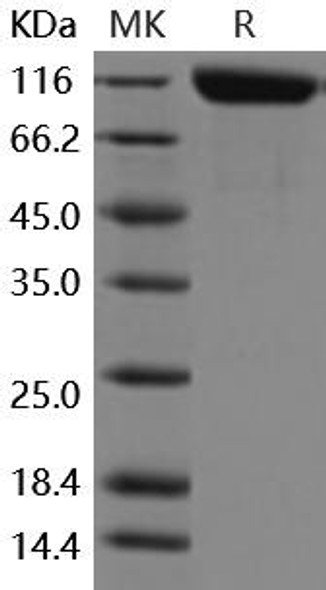Enzymes Recombinant Proteins
Mouse ANPEP Recombinant Protein (RPPB1402)
- SKU:
- RPPB1402
- Product Type:
- Recombinant Protein
- Species:
- Mouse
- Uniprot:
- P97449
- Research Area:
- Enzymes
Description
| Product Name: | Mouse ANPEP Recombinant Protein |
| Product Code: | RPPB1402 |
| Size: | 10µg |
| Species: | Mouse |
| Target: | ANPEP |
| Synonyms: | Anpep, AP-M, AP-N, Apn, Cd13, P150, mAPN, Alanyl aminopeptidase, Aminopeptidase M, Membrane protein p161, Microsomal aminopeptidase, CD13, Lap-1, Lap1, aminopeptidase N. |
| Source: | Sf9 Insect cells |
| Physical Appearance: | Sterile Filtered colorless solution. |
| Formulation: | ANPEP protein solution ( 0.5mg/ml ) contains PBS (pH 7.4) and 10% glycerol. |
| Stability: | Store at 4°C if entire vial will be used within 2-4 weeks. Store, frozen at -20°C for longer periods of time. For long term storage it is recommended to add a carrier protein (0.1% HSA or BSA).Avoid multiple freeze-thaw cycles. |
| Purity: | Greater than 95.0% as determined by SDS-PAGE. |
| Amino Acid Sequence: | ADPYAQEKNR NAENSATAPT LPGSTSATTA TTTPAVDESK PWNQYRLPKT LIPDSYRVIL RPYLTPNNQG LYIFQGNSTV RFTCNQTTDV IIIHSKKLNY TLKGNHRVVL RTLDGTPAPN IDKTELVERT EYLVVHLQGS LVEGRQYEMD SQFQGELADD LAGFYRSEYM EGDVKKVVAT TQMQAADARK SFPCFDEPAM KAMFNITLIY PNNLIALSNM LPKESKPYPE DPSCTMTEFH STPKMSTYLL AYIVSEFKNI SSVSANGVQI GIWARPSAID EGQGDYALNV TGPILNFFAQ HYNTSYPLPK SDQIALPDFN AGAMENWGLV TYRESSLVFD SQSSSISNKE RVVTVIAHEL AHQWFGNLVT VAWWNDLWLN EGFASYVEYL GADYAEPTWN LKDLMVLNDV YRVMAVDALA SSHPLSSPAD EIKTPDQIME LFDSITYSKG ASVIRMLSSF LTEDLFKKGL SSYLHTYQYS NTVYLDLWEH LQKAVNQQTA VQPPATVRTI MDRWILQMGF PVITVNTNTG EISQKHFLLD SKSNVTRPSE FNYIWIAPIP FLKSGQEDHY WLDVEKNQSA KFQTSSNEWI LLNINVTGYY LVNYDENNWK KLQNQLQTDL SVIPVINRAQ IIHDSFNLAS AKMIPITLAL DNTLFLVKEA EYMPWQAALS SLNYFTLMFD RSEVYGPMKR YLKKQVTPLF FYFQNRTNNW VNRPPTLMEQ YNEINAISTA CSSGLKECRD LVVELYSQWM KNPNNNTIHP NLRSTVYCNA IAFGGEEEWN FAWEQFRNAT LVNEADKLRS ALACSKDVWI LNRYLSYTLN PDYIRKQDTT STIISIASNV AGHPLVWDFV RSNWKKLFEN YGGGSFSFAN LIQGVTRRFS SEFELQQLEQ FKADNSATGF GTGTRALEQA LEKTRANIDW VKENKDAVFK WFTENSSHHH HHH |
| Biological Activity: | Specific activity is > 4,000pmol/min/ug, and is defined as the amount of enzyme that hydrolyze 1pmole of H-AlaAMC to Alanine and AMC per minute at pH7.5 at 25C. |
ANPEP or aminopeptidase N, is an enzyme, found in the small-intestinal and renal microvillar membrane and other plasma membranes. The enzyme has a critical part in the digestion of peptides after their hydrolysis by gastric and pancreatic proteases. ANPEP is also part ofthe processing of different peptides as well as peptide hormones, neuropeptides & chemokines. The protein takes part in angiogenesis, enhancing cholesterol crystallization &amino acid transport by formatting with SLC6A19 transport protein and regulating its activity.
ANPEP Mouse produced in Sf9 Insect cells is a single, glycosylated polypeptide chain containing �943 amino acids (33-966 a.a.) and having a molecular mass of �107.5 kDa. ANPEPis expressed with a 9 amino acid His tag at C-Terminus and purified by proprietary chromatographic techniques.
| UniProt Protein Function: | CD13: Broad specificity aminopeptidase. Plays a role in the final digestion of peptides generated from hydrolysis of proteins by gastric and pancreatic proteases. May play a critical role in the pathogenesis of cholesterol gallstone disease. May be involved in the metabolism of regulatory peptides of diverse cell types including small intestinal and tubular epithelial cells, macrophages, granulocytes and synaptic membranes from the CNS. Found to cleave antigen peptides bound to major histocompatibility complex class II molecules of presenting cells and to degrade neurotransmitters at synaptic junctions. Is also implicated as a regulator of IL-8 bioavailability in the endometrium, and therefore may contribute to the regulation of angiogenesis. Is used as a marker for acute myeloid leukemia and plays a role in tumor invasion. In case of human coronavirus 229E (HCoV-229E) infection, serves as receptor for HCoV-229E spike glycoprotein. Mediates as well human cytomegalovirus (HCMV) infection. Belongs to the peptidase M1 family. |
| UniProt Protein Details: | Protein type:EC 3.4.11.2; Protease; Receptor, misc.; Other Amino Acids Metabolism - glutathione; Membrane protein, integral Cellular Component: extracellular space; membrane; lysosomal membrane; integral to membrane; ER-Golgi intermediate compartment; vesicle membrane; external side of plasma membrane Molecular Function:peptidase activity; metallopeptidase activity; zinc ion binding; hydrolase activity; metal ion binding; aminopeptidase activity; peptide binding Biological Process: multicellular organismal development; aromatic compound metabolic process; angiogenesis; cell differentiation; proteolysis |
| UniProt Code: | P97449 |
| NCBI GenInfo Identifier: | 31077182 |
| NCBI Gene ID: | 16790 |
| NCBI Accession: | P97449.4 |
| UniProt Related Accession: | P97449 |
| Molecular Weight: | Molecular Mass: 103.6 kDaActual Protein�Molecular Mass: 110-130 kDa |
| NCBI Full Name: | Aminopeptidase N |
| NCBI Synonym Full Names: | alanyl (membrane) aminopeptidase |
| NCBI Official Symbol: | Anpep�� |
| NCBI Official Synonym Symbols: | Apn; AP-M; AP-N; Cd13; P150�� |
| NCBI Protein Information: | aminopeptidase N |
| UniProt Protein Name: | Aminopeptidase N |
| UniProt Synonym Protein Names: | Alanyl aminopeptidase; Aminopeptidase M; AP-M; Membrane protein p161; Microsomal aminopeptidase; CD_antigen: CD13 |
| UniProt Gene Name: | Anpep�� |
| UniProt Entry Name: | AMPN_MOUSE |






